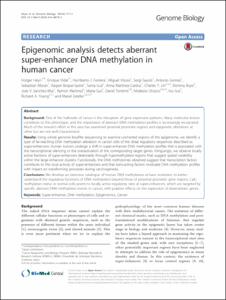Mostra el registre d'ítem simple
Epigenomic analysis detects aberrant super-enhancer DNA methylation in human cancer
| dc.contributor.author | Heyn, Holger |
| dc.contributor.author | Vidal, Enrique |
| dc.contributor.author | Ferreira, Humberto J. |
| dc.contributor.author | Vizoso, Miguel |
| dc.contributor.author | Sayols, Sergi |
| dc.contributor.author | Gomez, Antonio |
| dc.contributor.author | Moran, Sebastian |
| dc.contributor.author | Boque-Sastre, Raquel |
| dc.contributor.author | Guil, Sonia |
| dc.contributor.author | Martinez-Cardus, Anna |
| dc.contributor.author | Lin, Charles Y. |
| dc.contributor.author | Romina, Royo |
| dc.contributor.author | Sanchez-Mut, Jose V. |
| dc.contributor.author | Martinez, Ramon |
| dc.contributor.author | Gut, Marta |
| dc.contributor.author | Torrents, David |
| dc.contributor.author | Orozco, Modesto |
| dc.contributor.author | Gut, Ivo |
| dc.contributor.author | Young, Richard A. |
| dc.contributor.author | Esteller, Manel |
| dc.contributor.other | Barcelona Supercomputing Center |
| dc.date.accessioned | 2016-06-21T12:52:42Z |
| dc.date.available | 2016-06-21T12:52:42Z |
| dc.date.issued | 2016-01-26 |
| dc.identifier.citation | Heyn, Holger [et al.]. Epigenomic analysis detects aberrant super-enhancer DNA methylation in human cancer. "Genome Biology", 26 Gener 2016, vol. 17, núm. 11. |
| dc.identifier.issn | 1474-760X |
| dc.identifier.uri | http://hdl.handle.net/2117/88230 |
| dc.description.abstract | Background One of the hallmarks of cancer is the disruption of gene expression patterns. Many molecular lesions contribute to this phenotype, and the importance of aberrant DNA methylation profiles is increasingly recognized. Much of the research effort in this area has examined proximal promoter regions and epigenetic alterations at other loci are not well characterized. Results Using whole genome bisulfite sequencing to examine uncharted regions of the epigenome, we identify a type of far-reaching DNA methylation alteration in cancer cells of the distal regulatory sequences described as super-enhancers. Human tumors undergo a shift in super-enhancer DNA methylation profiles that is associated with the transcriptional silencing or the overactivation of the corresponding target genes. Intriguingly, we observe locally active fractions of super-enhancers detectable through hypomethylated regions that suggest spatial variability within the large enhancer clusters. Functionally, the DNA methylomes obtained suggest that transcription factors contribute to this local activity of super-enhancers and that trans-acting factors modulate DNA methylation profiles with impact on transforming processes during carcinogenesis. Conclusions We develop an extensive catalogue of human DNA methylomes at base resolution to better understand the regulatory functions of DNA methylation beyond those of proximal promoter gene regions. CpG methylation status in normal cells points to locally active regulatory sites at super-enhancers, which are targeted by specific aberrant DNA methylation events in cancer, with putative effects on the expression of downstream genes. |
| dc.description.sponsorship | The research leading to these results received funding from: the European Research Council (ERC), grant EPINORC, under agreement number 268626; MICINN Projects–SAF2011-22803 and BFU2011-28549; Ministerio de Economía y Competitividad (MINECO), co-financed by the European Development Regional Fund, ‘A way to achieve Europe’ ERDF, under grant number SAF2014-55000-R; the Cellex Foundation; AGAUR Catalan Government Project #2009SGR1315; the Institute of Health Carlos III (ISCIII), under the Spanish Cancer Research Network (RTICC) number RD12/0036/0039, the Integrated Project of Excellence number PIE13/00022 (ONCOPROFILE) and the research grant PI11/00321; the Sandra Ibarra Foundation, under IV ghd Grants for breast cancer research; the Olga Torres Foundation; the European Community's Seventh Framework Programme (FP7/2007-2013), grant HEALTH-F5-2011-282510 – BLUEPRINT, and the Health and Science Departments of the Generalitat de Catalunya. H.H. is a Miguel Servet (CP14/00229) researcher funded by the Spanish Institute of Health Carlos III (ISCIII). D.T. and M.E. are ICREA Research Professors. |
| dc.format.extent | 16 p. |
| dc.language.iso | eng |
| dc.publisher | BioMed Central |
| dc.rights | Attribution 4.0 International License |
| dc.rights.uri | https://creativecommons.org/licenses/by/4.0/ |
| dc.subject | Àrees temàtiques de la UPC::Enginyeria biomèdica |
| dc.subject.lcsh | Cancer--Research |
| dc.subject.lcsh | Epigenomics |
| dc.subject.lcsh | DNA--Analysis |
| dc.subject.other | Super-enhancer |
| dc.subject.other | DNA methylation |
| dc.subject.other | Epigenomics |
| dc.subject.other | Cancer |
| dc.title | Epigenomic analysis detects aberrant super-enhancer DNA methylation in human cancer |
| dc.type | Article |
| dc.subject.lemac | Càncer--Aspectes genètics |
| dc.subject.lemac | ADN--Dany |
| dc.identifier.doi | 10.1186/s13059-016-0879-2 |
| dc.description.peerreviewed | Peer Reviewed |
| dc.relation.publisherversion | http://genomebiology.biomedcentral.com/articles/10.1186/s13059-016-0879-2 |
| dc.rights.access | Open Access |
| dc.description.version | Postprint (author's final draft) |
| dc.relation.projectid | info:eu-repo/grantAgreement/EC/FP7/282510/EU/A BLUEPRINT of Haematopoietic Epigenomes/BLUEPRINT |
| dc.relation.projectid | info:eu-repo/grantAgreement/EC/FP7/268626/EU/Epigenetic Disruption of Non-Coding RNAs in Human Cancer/EPINORC |
| local.citation.publicationName | Genome Biology |
| local.citation.volume | 17 |
| local.citation.number | 11 |
| dc.identifier.pmid | 26813288 |
Fitxers d'aquest items
Aquest ítem apareix a les col·leccions següents
-
Articles de revista [374]


